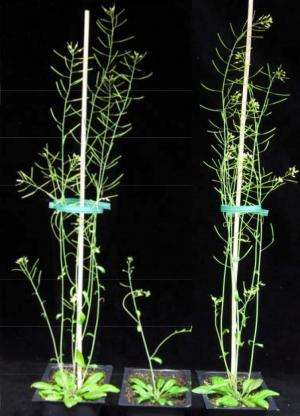Swords to plowshares: Engineering plants for more biofuel sugars

(Phys.org) —Xylan is a polysaccharide composed of pentoses – five carbon sugars – that represents a double-edged sword for advanced biofuels. On the one hand, as the world's second most abundant source of biomass after cellulose, xylan is an enormous source of stored solar energy. On the other hand, the presence of xylan makes it more difficult to extract the hexoses – six carbon sugars – in cellulose that are more easily fermented into biofuels than pentoses.
Researchers at the U.S. Department of Energy (DOE)'s Joint BioEnergy Institute (JBEI) are using the tools of synthetic biology to beat this double-edged sword into plowshares. In one study, they engineered plants with more extractable xylan. Now they have engineered plants with low xylan content and a higher proportion of cellulose in the biomass.
"We've shown that it is possible to obtain plants that have reduced amounts of xylan in their cell walls while still preserving the structural integrity of the xylem vessels that the plants use for nutrient transport," says Henrik Scheller, who heads JBEI's Feedstocks Division and directs its Cell Wall Biosynthesis group, and also holds an appointment with Berkeley Lab.
Working with the model plant, Arabidopsis, as a demonstration tool, Scheller and his collaborators used three mutant lines known to be xylan-deficient to engineer plants with up to 23-percent reduced levels of xylan compared to wild type plants. In addition, following a hot water pre-treatment the engineered plants also realized a 42-percent increase in saccharification yield – the breakdown of carbohydrates into fermentable sugars that is key to more efficient production of advanced biofuels.
"We've shown that spatial and temporal deposition of xylan in the secondary cell wall of Arabidopsis can be manipulated by using the promoter regions of vessel-specific genes to express xylan biosynthetic genes," Scheller says. "This engineering approach has the potential to yield future bioenergy crop plants that are more easily deconstructed and fermented into biofuels."
A paper describing this work appeared in the open-access journal Biotechnology for Biofuels. The paper is titled "Engineering of plants with improved properties as biofuels feedstocks by vessel-specific complementation of xylan biosynthesis mutants." It can be downloaded here.
Journal information: Biotechnology for Biofuels
Provided by Lawrence Berkeley National Laboratory



















